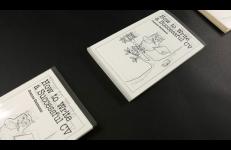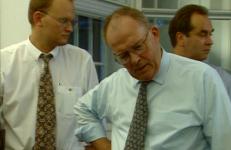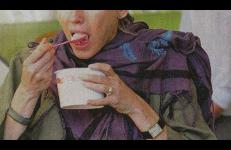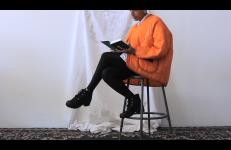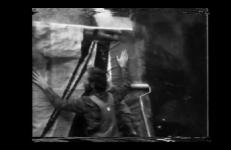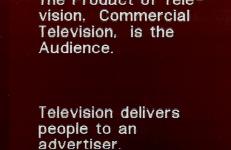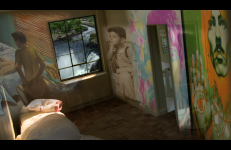New to the 2 Spirit lifestyle? `Want to talk to someone in the Spirit and the Flesh instead of reading The Spirit and the Flesh? We have just the service for you! Call now and for only 19.99 a month you can get instant unlimited telephone access to traditional knowledge and support. We also provide monthly gifts for subscribers, call now and we can hook you up with this beaded whisk! Perfect for DIY spankings and pancakes the morning after your first snag!
Advertisement(s)
A promotional vehicle with lane-changing tendencies, but both hands kept on the wheel at all times.
First video in The Variations cycle.
"The head of a Berlin advertising agency explains his proposed strategy to his potential client, a Danish optical company. The communication strategy that we ultimately came up with as a basis or any creative act or means of communication has three headings. The first is 'relevant, not arrogant'; the second, 'varied, not uniform'; and the third is, 'creative, not pushy'. These are essentially translations, strategic translations of your basic requirements and your analysis of the market, as well."
-- From the transcription of The Appearance
The Bible Belt is exactly what its name implies: a belt attached to a bible that comes with a sturdy brass buckle, in the name of "Jesus", dipped in gold. We've created a special television spot of a televangelist selling the belt. Edited as a typical day of channel grazing and zapping, the televangelist plays between "real" television preachers and scrambled porn.
Breakfast of Champions is an installation created in 1991 by the artist duo Ligorano Reese, comprising Nora Ligorano and Marshall Reese. The piece critiques the media's portrayal of the Gulf War and its influence on public perception. The installation features a breakfast table set with an American flag-themed place setting, a cup of coffee, half-eaten toast, and a copy of The New York Times.
The language and imagery related to celebrity perfumes (both descriptive and visual) are a starting point to think about consumer desires and the corruptness of branding. Give us your songs, your smells and we will give you everything. The rich get richer, everyone smells poorer.
Robert Heineken (1931-2006) used technically sophisticated photographic methods to mingle erotic images with visuals from TV and advertising. The American artist was known for appropriating and re-processing images from magazines, product packaging or television. In the "Are You Real" series from 1964 to 1968, he created a portfolio of images filled with unexpected and sometimes surreal juxtapositions by placing a single magazine page on a light table, so that the resulting contact print picks up imagery from both sides of the page.
If you lived here you’d be home by now occurs during the years of Williamsburg Brooklyn’s overheated real estate market, just before the 2008 financial bubble burst. Ligorano Reese’s video renders the New York luxury high rise market of the aughts into an extraterrestrial lunar landscape. The voiceover is cut up and collaged from actual real estate copy descriptions of luxury living amenities. The video played in a storefront installation on Bedford Avenue, ground zero for Brooklyn’s rabid transformation of the East River in New York City.
A familiar landscape comprised of big box stores and parking lots proves a rich site for longing, intimacy, and radical change. Celebrities are observed in this environment and are reduced to ordinary beings in the process. An enigmatic protagonist reveals little moments of subjectivity that escape into the piece like a contaminant, rupturing the view and evidencing the paradox of connection and belonging within systems that simultaneously contain us and comprise us.
Sections 1-30 of an incomplete extended poem describing the artist's connection to the radical black tradition. The completed poem will be formed of 180 sections.
"Lessons are all about constraints; they are thirty seconds, must feature a black figure, and I have rules about where to make cuts, how to edit sound, etc."
— Martine Syms in conversation with Aram Moshayedi, Mousse Magazine
Sections 31-60 of an incomplete extended poem describing the artist's connection to the radical black tradition. The completed poem will be formed of 180 sections.
"Lessons are all about constraints; they are thirty seconds, must feature a black figure, and I have rules about where to make cuts, how to edit sound, etc."
— Martine Syms in conversation with Aram Moshayedi, Mousse Magazine
West coast artists, Mike Mandel (b.1950) and Larry Sultan (1946-2009) became artistic collaborators in 1972 while both enrolled in the San Francisco Art Institute’s MFA program. This interview captures the duo’s camaraderie (look closely, they are wearing matching shirts!) and youthful optimism as they describe the impetus behind their California billboard installations of the early seventies.
A surrealistic deep dive into the interactive menus and screens that make up the mediated landscape.
A short recruitment video for the public-secret society ‘New Red Order’, which simultaneously satirizes and sincerely engages with solidarity and the desire for Indigenous epistemologies.
This episode includes: two more adverts, considerations of the future, a multiple projection spectacular in miniature, a riverine jaunt, much fog, and an ending x 2.
This is the fourth and final episode in The Variations cycle.
The latest in Muntadas and Reese's series documenting the selling of the American presidency features political ads from the 1950s to ads from the 2012 campaigns, and highlights the development of the political strategy and marketing techniques of the TV campaign process.
The latest in Muntadas and Reese's series documenting the selling of the American presidency features political ads from the 1950s to ads from the 2012 campaigns, and highlights the development of the political strategy and marketing techniques of the TV campaign process.
The 2016 installment in Muntadas and Reese's series documenting the selling of the American presidency features political ads from the 1950s to ads from the 2016 campaigns, and highlights the development of the political strategy and marketing techniques of the TV campaign process.
The 2016 installment in Muntadas and Reese's series documenting the selling of the American presidency features political ads from the 1950s to ads from the 2016 campaigns, and highlights the development of the political strategy and marketing techniques of the TV campaign process.
The 2024 installment in Muntadas and Reese's series documenting the selling of the American presidency features political ads from the 1950s to ads from the 2024 campaigns, and highlights the development of the political strategy and marketing techniques of the TV campaign process.
The 2024 installment in Muntadas and Reese's series documenting the selling of the American presidency features political ads from the 1950s to ads from the 2024 campaigns, and highlights the development of the political strategy and marketing techniques of the TV campaign process.
Television Delivers People is a seminal work in the now well-established critique of popular media as an instrument of social control that asserts itself subtly on the populace through “entertainments,” for the benefit of those in power—the corporations that mantain and profit from the status quo. While canned Muzak plays, a scrolling text denounces the corporate masquerade of commercial television to reveal the structure of profit that greases the wheels of the media industry. Television emerges as little more than a insidious sponsor for the corporate engines of the world.





